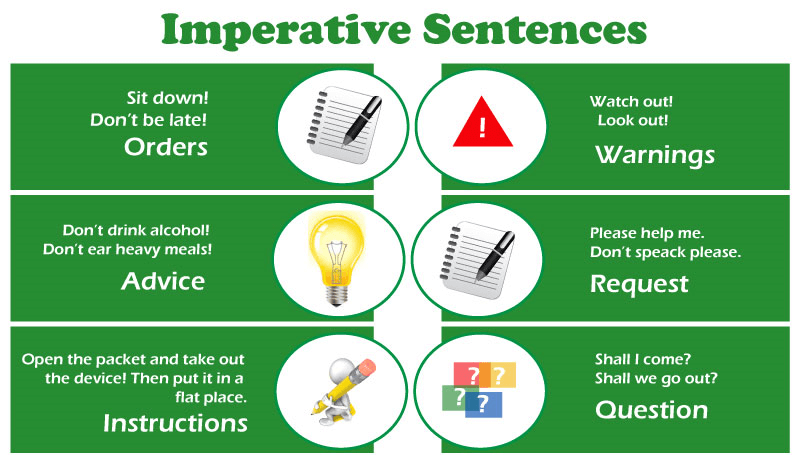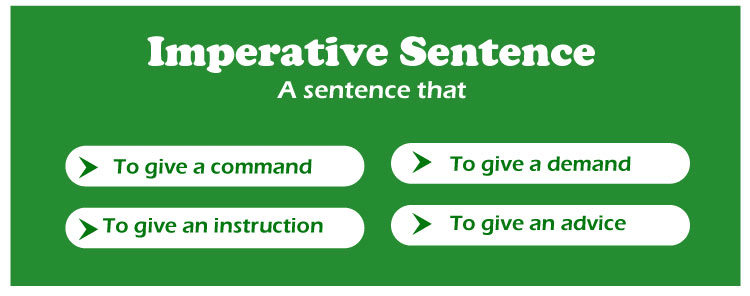Imperative SentenceImperative sentences are used to explain what you require others to do. You use imperative sentences whenever you tell a buddy where to take you after the office, whenever you instruct a new colleague how to fulfill their job obligations, and even when you order your dog to stand. 
What Is an Imperative Sentence?The imperative mood is utilized whenever you make a request, give advice, issue a demand, or give instructions. Imperative sentences are sentences that employ the imperative mood. To put it simply, an imperative statement is one that instructs someone to perform a task. When one employs voice commands with virtual assistants like Alexa and Google Assistant, they are utilizing imperative sentences. It is not always necessary that the other individual is a person. Similarly, telling your dog to stand, remain, leave it, or come is an example of an imperative sentence. There is no need for a subject in imperative statements. Also, keep in mind that the verb in an imperative statement must always be in the simple present tense. Imperative sentences have a full stop or an exclamation mark at the end. Imperative Sentence DefinitionAn imperative sentence is one that "expresses an order," as per the Oxford Learner's Dictionary, and one which "gives a command or makes a request to do something," as per the Cambridge Dictionary. As defined by the Collins Dictionary, an imperative sentence is one that is meant to signify "a mood of verbs employed in giving instructions, making requests, etc." An imperative sentence, according to Merriam-Webster, has the "capacity of restraining, controlling, and directing." An imperative sentence might instruct its subject to do (or not do) anything. Consider the following examples:
Negative Vs. Positive Imperative SentencesThere are two kinds of imperative sentences: affirmative and negative. An affirmative imperative statement directs the reader or listener to do something. Here are a couple of such examples :
A negative imperative statement instructs the reader or listener to refrain from doing something. Here are several examples :
Imperative, Conditional SentencesAlthough the majority of the sample sentences we've utilized thus far have been simple, one-clause sentences, don't assume that every imperative statement is similarly short. An urgent sentence can have numerous clauses, and these multi-clause statements are frequently conditional sentences. A conditional sentence is one that depicts a cause and its (certain, likely, or even exceedingly unlikely) effect. Consider the following conditional imperative sentence examples :

Recognizing Imperative SentencesPunctuation is the first indicator of an imperative statement. The majority of these types of sentences end with a period and, occasionally, an exclamation mark. Just keep in mind that imperative sentences aren't the only ones that conclude with a period or exclamation mark (as you'll see later). The punctuation is merely your first clue that you are reading an imperative statement. Examine the verb in these sentences next. In most cases, imperative phrases start with verbs that make a command. The subject is another hint. Do you notice any? As an imperative sentence gives a direct order, the subject is usually implied rather than expressed. An imperative sentence's principal function is to deliver instruction, make a request or demand, or provide an invitation or counsel. Let us revisit some imperative statements and evaluate their function:
Imperative Sentence StructureImperative sentences almost always begin with an imperative verb. Imperative verbs refer to the verb root types that generate imperative sentences when accompanied by their sentence objects. Consider the imperative verbs highlighted in these examples:
You'll notice that the verb normally comes first in an imperative statement. However, this is not always the case. Examine how the verb appears in the following examples:
The subject of an imperative statement is usually implied. In some imperative phrases, the verb is followed by an indirect object. There isn't any indirect object in others. In a few imperative sentences, such as these, the verb serves as the complete sentence:
An imperative statement is always followed by a period or an exclamation mark. How To Lighten Imperative SentencesThe accompanying imperative language may come across as impolite: "Don't instruct me what I should do." One issue that authors frequently face with imperative sentences is that they can seem dictatorial, even when the writer does not intend it to be. This is particularly true when talking via email or text message since you can't ease the request using your tone of voice or body language. So, how do you tell folks what to do without seeming like you're giving them commands? 
There are several options, and a few factors determine the best one for a specific sentence:
In general, including the word "please" in an imperative sentence instantly softens its tone. Consider the following sentences : Switch off the lights. Please switch off the lights. Another technique to ease the tone of a request is to transform it into a question: Please place our group near the window. Can you please seat our group close to the window ? It is no longer an imperative statement in this circumstance, but it accomplishes the same aim of conveying a request to the listener. What about cases in which you must issue clear instructions? Context can be useful. For instance, if your party invitation merely asks, "Please do not park in our yard," this could be misconstrued as chilly and harsh. However, if you accompany it with the rationale for the instruction, such as "Don't park in our yard; it's a common parking space and our neighbors must be able to go in and out even during the gathering," your tone shifts from demanding to accessible. Tone can be difficult to navigate in written communication, especially when interacting with individuals you've never met in person. If you're unsure about how a sentence or a lengthier text piece will be received by its reader, try and read it loudly and listen to its tone. It might also be beneficial to have another individual read your writing and provide feedback on how your tone comes through. Except in very informal communication, don't use emoticons to soften your tone. While you may view an emoji one way, the recipient may understand it differently, and you may be perceived as smug, dismissive, or sarcastic. This just makes your point less clear, which is exactly what you want when utilizing imperative sentences. When appropriate, soften your tone with civility, but don't overcomplicate your writing with niceties. Imperative Sentences' ComponentsImperative MoodImperatives inform someone what they should or should not do. All imperative sentences have verbs expressed in an "imperative mood," which means they deliver commands. A few of the most common ones are "don't," "please," "stop," and so on. Consider the following two sentences: Don't spoil the puppy. The imperative verb "do not" expresses a command. He didn't spoil the dog. The indicative verb "didn't" denotes a lack of activity. Imperative verbs issue commands, but indicative verbs "suggest" (display) what occurred. So you can't instruct someone what to do using an indicative verb. Here are a few more instances of imperative verbs:
Imperative Sentences and Their VarietiesAs previously stated, imperative sentences
A. Make A Request or A WishThere are various sorts of imperative sentences, each of which functions differently. Here are a few imperative statements that express courteous requests or wish to others:
B. Convey an InvitationHere are several necessary sentences that invite someone to dinner (pay attention that these sentences are in the question type).
C. Issue A Request Or CommandHere are several imperative statements, each of which contains a request or demand (pay attention that these statements are more strong requests).
D. Provide InstructionsImperative sentences that provide instructions, like route planning/directions or recipes, are quite common:
As you can observe, imperative phrases can convey a wide array of information. How to Compose an Imperative SentenceComposing an imperative sentence differs from writing other sorts of sentences, primarily due to the subject. Imperative sentences typically start with a verb and may appear to lack a subject! However, this is because imperative phrases are inherently aimed toward someone because they convey direct directions. It is frequently unnecessary to name the topic because it is assumed that the sentence is addressed to a certain individual or group of people. To make things clearer, consider putting a person's name at the start of several imperative sentences:
The statements above still sound right if the underlined subjects are removed:
You can also see that these all make logical sense since these imperative verbs indicate that they are orders. Here are some more pointers on how to write imperative sentences: A. Select A Tone of VoiceDetermine which voice tone is best suited to the goal of your statement. The tone of an imperative sentence could be: neutral (like a meal ) fairly impartial (like a request ) used to indicate intense feelings (like a serious command ) B. Make A Decision on PunctuationThe tone of the statement will determine whether it concludes with a period or an exclamation mark: Consider whether your sentence is a demand, a recommendation, or a wish. An exclamation mark should accompany a forceful or demanding tone: Stop eating the parrot ! A period is all that is required for a suggestive or courteous tone: Please do not offer the dog nuts. Ultimately, the tone and punctuation of an imperative sentence are entirely up to you. When Should You Use an Imperative Sentence?Using imperative sentences is simple?you do it all the time without even realizing it! Here are some pointers on how to use them effectively: a. PurposeKeep in mind their purpose. They can be used to :
b. The SubjectNote that an imperative sentence's subject is recognized since all imperative phrases are directed toward another individual or group of people. c. DistinctionsNote the differences between imperative sentences and non-imperative sentences: An imperative statement is never an exclamatory statement, even if it finishes with an exclamation mark, since exclamatory sentences do not share commands. An imperative sentence is also not a declarative sentence, even if it concludes with a period since declarative phrases only exchange statements, not demands/ commands or desires.
Next TopicImperative Sentence Examples
|
 For Videos Join Our Youtube Channel: Join Now
For Videos Join Our Youtube Channel: Join Now
Feedback
- Send your Feedback to [email protected]
Help Others, Please Share










